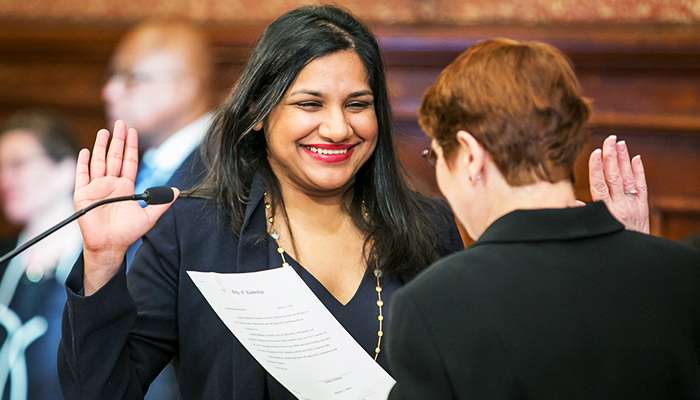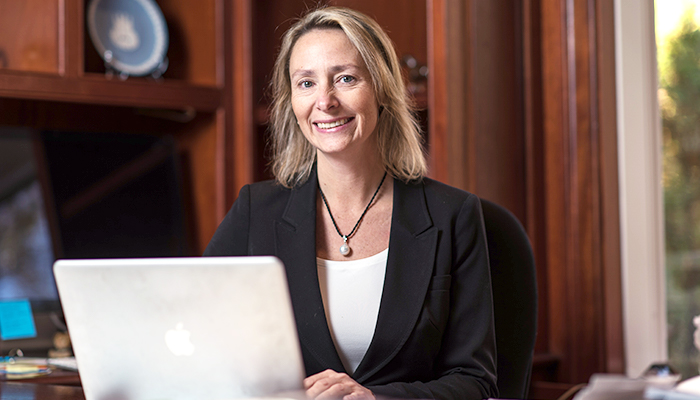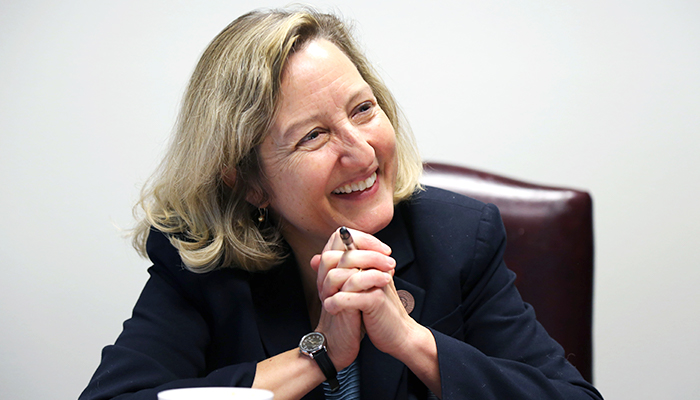Clerkships Deliver Insights, Spark Success
Long considered a prestigious opportunity for recent law school graduates, judicial clerkships provide invaluable insights into what judges do day-to-day, and how they think, write and otherwise ...
06.11.2018
After Law School Alumni
While the number of women in elected office across the country has been slowly increasing, in 2017, they made up only 21 percent and 19.6 percent of the U.S. Senate and House of Representatives, respectively. At lower levels of government, the numbers aren’t much better: women currently hold a mere 25 percent of state legislature seats and only 22 of America’s 100 largest cities have female mayors.
But incremental gains could soon give way to much larger ones. In the 10 months leading up to the 2016 presidential election, 1,000 women contacted Emily’s List, a political organization dedicated to electing women, to inquire about running for office. And in the year following the election, more than 22,000 women did the same. In Virginia’s November election, 11 of the 15 seats that Democrats picked up in the statehouse were flipped by female candidates. Both major political parties have emphasized recruiting female candidates heading into the 2018 midterm elections.
The Reporter spoke with three Northwestern Law alumnae — two Democrats, and one non-partisan (to our knowledge, there are no Republican alumnae currently in office or running) — who have recently joined the thousands of women across the country seeking public office.

Sumbul Siddiqui
City Councilor, Cambridge, Mass.
Sumbul Siddiqui (JD ’14) first interacted with the Cambridge City Council when she co-founded a youth council as a freshman at Cambridge Rindge and Latin High School. “We worked a lot with the city of Cambridge, so early on I had this exposure to the whole government. I remember thinking, ‘huh, being a city councilor would be such a great job.’”
In November 2017, at 29 years old, she became the first Muslim woman elected to the position. Siddiqui, who grew up in Cambridge public housing, had long thought about how she could make the city work better for more people.
“I knew I was going that direction, then post-2016 election, I wanted to figure out how, locally, I could do more,” she says. “It goes to this idea of representation. I looked at our current city council and it was a lot of the same people who had been there for 10 or 15 years. It was mostly men, mostly white men. Given what was happening nationally, I thought this is the time to actually bring on some new people, younger people as well.”
Siddiqui decided to run in December 2016, and participated in Emerge America, a six-month training program aimed at increasing the number of progressive women leaders from diverse backgrounds in public office.
Siddiqui’s interest in public service never faltered — not during her undergraduate years at Brown University, or during her time as an AmeriCorps fellow, or as a student at Northwestern Law. In 2011, she took Professor Len Rubinowitz’s public interest practicum, where she worked for the Lawyers’ Committee for Civil Rights on an economic development project partnering with law firms. She also took Professors Esther Barron and Steve Reed’s Entrepreneurship Law Clinic, an experience she says helped her post-Law School career at Northeast Legal Aid, where she provided transactional legal services to low-income individuals. “Those two experiences really shaped my desire to work for the public good,” she says.
Voters responded well to Siddiqui’s work as a lawyer, she says. “When I was campaigning, I think people really loved that I was helping others achieve their American dream — advising them on employment law issues, incorporating their businesses, drafting contracts.”
On November 7, Siddiqui received the second-highest number of first-choice votes among all candidates in the city’s ranked voting system, easily becoming one of the nine councilors from a pool of 26 candidates. She was sworn in on January 1.
Now that she’s in office, Siddiqui hopes to make Cambridge, known internationally as the home to Harvard University, work for all its residents. “We are a city of about 110,000 people and it’s a very affluent city. We have a big budget, but if you look at the numbers, we have extreme income inequality,” she says. “I am someone who comes from a low-income background, so my priority is to make sure our policies are prioritizing low-income and middle-income individuals.”

Sara Love
Running for Maryland House of Delegates
“When I was seven, I announced to my mother that when I grew up I wanted to help people, and I was going to become a lawyer, and I was going to run for office,” says Sara Love (JD ’93). Love, who is currently running to represent Maryland’s 16th district in its House of Delegates, has made good on that promise.
Love came to Northwestern Law after graduating from Princeton University, and quickly immersed herself in the public interest sphere, leading the Women’s Caucus and Feminist Symposium. Like Siddiqui, she credits Rubinowitz’s practicum with helping prepare her for future public service roles. “Professor Rubinowitz’s Law and Social Change course has stuck with me my whole career,” she says. “He is one of those professors who is not only a fantastic professor, but a wonderful mentor.”
After law school, Love worked on civil rights cases and eventually served as general counsel to a group of nine women’s health clinics nationwide. She then served as general counsel for NARAL Pro-Choice America and later public policy director of the ACLU of Maryland, a position she held until 2016, and one that she believes will make her particularly effective as a delegate. “I know how Annapolis works, so I’m able to jump in on day one,” Love says. “I have a track record of getting things done down there. I drafted a package of four bills on privacy and technology and I got the head of the Tea Party caucus and a progressive Democrat in the House, and a very conservative senator and a very progressive senator in the Senate, to co-sponsor my bills. We got three of them passed with bipartisan support.”
The decisions of the current administration, Love says, serve as a reminder of why she’s seeking office. “Everything I have worked on is being undermined in Washington — from immigrants’ rights to reproductive rights, voting rights, LGBT rights, civil asset forfeiture, police accountability, militarization of police forces — I have worked on all of these things in Annapolis and can continue to work on them not only for the residents of my district, but for the state of Maryland.”
Love declared her candidacy in August and faces a Democratic primary election in June. So far, she says, the campaign experience has been “exhilarating, exhausting, overwhelming, and fun all at the same time. It is a tremendous undertaking, so it’s one that you need to think very long and hard about with your family and support system, but I would encourage everybody who’s interested to get involved because it’s also a very rewarding experience.”
One unexpected perk of running? “I used to be a relatively shy person, especially in law school,” she says. “I was not a big fan of raising my hand, didn’t do it all that much. The thought of knocking on strangers’ doors was a little intimidating. I’ve been surprised at not only how easy it is, but how friendly and supportive people have been at the doors.”

Kirsten Engel
Arizona State Representative
Kirsten Engel (JD ’86) was motivated to run for the Arizona House of Representatives in 2016 by two major issues: education and the environment.
After a career as an attorney at the Environmental Protection Agency and later the Sierra Club Legal Defense Fund, Engel began a teaching career that took her to Tulane, Vanderbilt, Harvard and eventually, the University of Arizona. “In late 2015, I had just finished a stint as the academic dean at the University of Arizona College of Law,” she says. “At the same time, my daughter was attending public school in Tucson.” Engel says she began to notice an overlap between the drop in public university funding that she was dealing with as a university administrator, and the drop in K-12 funding she was seeing as a parent. “It was really happening across the board, from K through 12, all the way through the university system.”
At the same time, Engel realized that her career had uniquely equipped her to shed a spotlight on the need to protect Arizona’s environment. “Certainly, climate change has been a big issue, and the Southwest is particularly vulnerable to drought,” she says. “The impacts of climate change are definitely something that will affect this state greatly. I thought ‘Well, I’ve had a wonderful career, and this is the next step — I can start giving back.’”
Engel, a Democrat, won her seat in 2016 and has now spent over a year serving as a state representative for the 10th district — she still teaches, too, while the legislature is out of session. One of the few lawmakers with a JD, she serves on the judiciary committee as well as the environmental committee.
“We basically meet between January and the beginning of May, but in that time, it’s at least four days a week that we are on the floor, or holding committee hearings. So it is difficult for a professional to balance their work life and serve in the legislature at the same time, and I think that’s one of the reasons you don’t see that many attorneys in the Arizona legislature,” she explains. “But at the same time, it’s an intensely legal job. We spend all of our time drafting laws and trying to figure out how court decisions have affected the current law, and whether or not we need to amend the current law. Having a legal background has been fabulous in terms of being able to dive into these issues.”
Engel, a member of the minority party, is proud of the “small incremental accomplishments” she and her colleagues made in her first year and looks forward to the day she gets to do even more. In August, she announced she’d be running for reelection in 2018. “I think things are changing in Arizona. I think in 2018 they’ll probably be very different, so it’s exciting to be serving at this time,” she says.
As for campaigning again, Engel says she now knows what she’s in for. “Campaigning takes a tremendous amount of time. It definitely is not something to do lightly. It definitely took a toll on my family,” she says. “On the other hand, having a daughter in middle school who sees her mother getting out there, taking stands on issues, talking to people — I think that’s been inspiring to her, and an educational process. That’s also kept me going, because I think we need to be role models for our kids, and especially girls.”
Long considered a prestigious opportunity for recent law school graduates, judicial clerkships provide invaluable insights into what judges do day-to-day, and how they think, write and otherwise ...
Northwestern Pritzker School of Law is pleased to announce the appointment of four new Law Board members. The Law Board is dedicated to advancing Northwestern Pritzker Law and supporting its ...
Northwestern Pritzker Law alumna Christine M. Evans (JD ’03, LLM-IHR ’11) has received the John Paul Stevens Foundation’s inaugural Justice John Paul Stevens Distinguished Alumni Fellow Award. ...